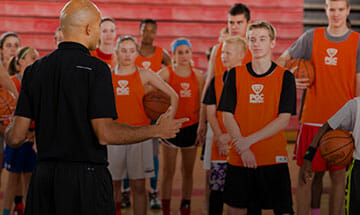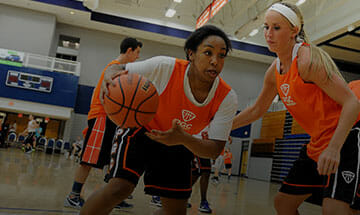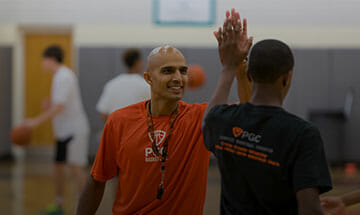Top Three Ways You are Ruining Your Off Season
It’s that time of year when many basketball athletes start saying something along the lines of, “I’m going to do better next year.” With the best intentions they enter the off-season thinking how they learned some gold nuggets from mistakes, trials, and tribulations of the past season and how they “won’t let them happen again.”
As a speed, strength and conditioning coach I often find myself politely nodding in agreement as basketball players return to the weight room with big talk of their off-season.
“Coach Amanda, I’m not going to get pushed around under the basket anymore.”
“I’m going to make sure I become so fast I never get crossed again.”
And the all too often, “I will dunk in a game next year.”
It’s still early, so they are eager to work with the determination, passion and hunger that comes from knowing they won’t be playing in competitive games that get covered by their local newspapers for a few months. Athletes then proceed to complete their first off-season speed and strength workout with me and then promptly walk out the door, and start ruining their off-season.
READ MORE: 3 STEPS TO MAPPING A SUCCESSFUL OFF SEASON
I can’t blame them. It’s really easy nowadays to ruin a perfectly good, well-intended off-season. Day by day, action by action, they fall back into old habits that aren’t in line with their aspirations. Their lack of precision, the P in SCHAPE, quickly erodes the gains and development they so eagerly told me about that first workout back in the weight room.
How can you avoid a similar fate? Start by facing up to these three ways you can ruin your off-season.
lack of sleep
Sleep does a body good and a lack of sleep will deteriorate your off-season training and progress.
It is well known that highly successful athletes like Tom Brady have a bed-time that they stick to zealously. The power and benefit of sleep for athletes include:
- Increased energy (for those tough off-season workouts)
- Improved mood
- Faster and better recovery from workouts
- Improved brain function
If you don’t commit to getting ample sleep regularly you are slowing your off-season growth and development. And you are trying to build muscle and get stronger this off-season aren’t you?
Sleep tips:
- Set a bedtime and commit to it.
- Catch up on sleep on the weekends. Studies have shown that sleep is something we can catch up on (but can’t store for future use). Don’t go through your off-season as a tired zombie that isn’t fully awake in the gym, classroom, or weight room. Get your sleep!
POOR DIET
You want to improve and change your game for the better, but you aren’t disciplined to improve and change your diet for the better.
I’ve never met an athlete that regretted improving their diet, but I’ve heard all too many times athletes say how disappointed they are by their lack of muscle growth or lack of energy during games. While the subject of nutrition could be a multi-part blog post series in and of itself, here is one of the most common problems basketball players encounter.
You’re not getting enough calories in to see substantial growth.
Basketball burns a lot of calories, try over 550 calories per hour for a player weighing 150 lbs! in addition to having a healthy teenage metabolism that burns calories quickly and easily, it is very easy for basketball players to not get enough calories in, and thus, their body runs out of fuel to perform and grow.
How do you know if you are, or are not getting enough calories?
- You could use a calorie calculator to figure out on average how many calories you need per day. Then you can count your calories every day to make sure you are hitting your number (and that’s just the number to maintain your weight).
- Or you can do the weigh-in method. Each Tuesday morning you weigh yourself and record your weight. If your goal is to gain weight you should see yourself adding 1-2 pounds a week (if you are working out this will be a good, mainly muscle, weight gain) and if your goal is to lose weight you should be loosing 1-5 pounds a week (depends on your starting body weight, but the scale should be moving down gradually each week).
If you are not seeing the scale change then, for those trying to gain weight, it’s peanut butter jelly time. One trick my division one basketball players have used with great success is adding the consumption of a big peanut butter jelly sandwich right before they go to bed (you can sub almond butter, honey, bananas, non-allegoric options, just make sure it is a sandwich that’s high in calories, protein, fat, and sugar). If you add one sandwich to your regular eating and you still don’t see the scale move, then add two sandwiches each night!
If you are trying to lose weight, then limit, or cut out completely, your carbohydrate intake after 7 p.m. at night. Stick to protein and veggies and forego the pasta, breads, desserts, and fruits at night. (Note: I am not a registered dietitian; I am merely sharing methods that have worked for my high level basketball players in the past).
NO GROWTH MINDSET
You don’t put technology, or your parents, to good use at your AAU and travel games.
You’re in-between weekend tournament games mindlessly watching the clock tick by waiting for your next game instead of reviewing your last game’s film. If you are fortunate to have your parents attend your games then ask them to film you on either their smart phone (or better yet yours) or tablet for you to watch, learn, study, and take notes from (writing your film notes in your PGC notebook is a good idea).
Yes, AAU and travel teams are fun, but they are also unique opportunities for you to watch yourself on film and then very quickly go out and practice applying a skill or habit you were lacking in the previous game. Your parents and you can even have some fun by taking guesses on how many times you peeked at the rim or hunted the paint or any other habit you are trying to improve this off-season. And what if your parents are not at the games? Then ask one of your teammates’ parents to film you and your teammate (a win for you and your teammate!)
Don’t ruin a perfectly good, well-intentioned off-season by missing out on these day by day, action by action, habits that can help you stay in line with your aspirations. Be precise, avoid the distractions that can rob you of sleep, ruin your diet, or limit your game development. Instead, commit to an off-season that lives up to the hype.
Related Articles
5 Ways to Practice Mental Toughness
Here are five ways to practice your mental toughness off the court. If you practice these five things, every day, you’ll develop greater self-discipline. You’ll become unstoppable in anything you do. It is five things you will have to rise above your feelings every day. That is how you build mental toughness. You develop, as a habit, a muscle of rising above your feelings to level of your aspirations and commitments.
Why Is My Performance Inconsistent?
Do you ever feel like your performance in games is consistently inconsistent? That you’re putting in the same hard work at practice every day, yet some days you play really well and others you don’t play well at all? If that’s you, you’re not alone. If that’s not you, don’t worry—the frustration is coming soon!
Quit Being So Hard to Coach
COACHES HAVE FAVORITES!! Of course, they have favorites—their favorites are the players they can trust, on and off the court.
Here are four reasons you may not be getting the playing time you think you deserve.
About PGC
PGC Basketball provides intense, no-nonsense basketball training for players and coaches. Our basketball camps are designed to teach players of all positions to play smart basketball, be coaches on the court, and be leaders in practices, games and in everyday life.
We combine our unique PGC culture with a variety of teaching methods and learning environments to maximize the learning potential of those that attend our sessions. In addition to spending 6-7 hours on the court each day, lessons will be reinforced through classroom sessions and video analysis.
Our goal at PGC is to empower you with the tools to fulfill your basketball dreams, while also assisting you in experiencing the joy of the journey.
To learn more about PGC Basketball, including additional basketball training tips and videos, visit our YouTube Channel or find us on Facebook, Instagram, and Twitter.













Share This Post